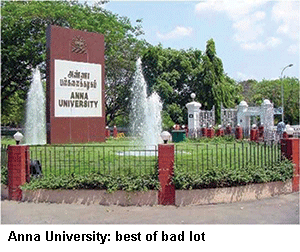 Tainted with corruption, mismanagement and poor quality teaching, Tamil Nadu’s once highly reputed 22 state universities have lost their lustre. In the latest NIRF (National Institutional Ranking Framework) 2017 league tables of India’s best universities compiled by the Union HRD ministry, only one state government university — Anna University — is ranked in the Top 10 (#6) with the Tamil Nadu Agricultural University, Coimbatore in the Top 20. Moreover, in the NIRF 2017 ‘overall’ category, only IIT-Madras and Anna University among government institutions of higher education are ranked among the Top 20, although nearly 20 government and private deemed universities in the state are ranked among the Top 100 institutions.
Tainted with corruption, mismanagement and poor quality teaching, Tamil Nadu’s once highly reputed 22 state universities have lost their lustre. In the latest NIRF (National Institutional Ranking Framework) 2017 league tables of India’s best universities compiled by the Union HRD ministry, only one state government university — Anna University — is ranked in the Top 10 (#6) with the Tamil Nadu Agricultural University, Coimbatore in the Top 20. Moreover, in the NIRF 2017 ‘overall’ category, only IIT-Madras and Anna University among government institutions of higher education are ranked among the Top 20, although nearly 20 government and private deemed universities in the state are ranked among the Top 100 institutions.
The performance of Tamil Nadu’s government universities in international higher education rankings is inevitably more disappointing. In the Quacquarelli Symonds (QS) World University Rankings 2017-18, Anna University, Chennai, is ranked in the 651-700 band and in the Times Higher Education World University Rankings 2018, IIT-M is ranked in the 601-800 band with Annamalai University, Chidambaram, in the 801-1,000 band.
In an attempt to evaluate the performance and improve the quality of Tamil Nadu’s 22 state government universities, the AIADMK government plans to introduce its own ranking framework from June 2018. According to state education ministry sources, this ranking framework will assess universities under five broad parameters — research, teaching, placement, public-peer perception and equity apart from 29 other sub-parameters. Sunil Paliwal, principal secretary for higher education, says a private agency which designed a university ranking framework for Karnataka, will most likely be commissioned to conduct a similar exercise for Tamil Nadu, although the state will evolve its own model.
Even as informed educationists in the state welcome the AIADMK’s intent to introduce a ranking framework for state universities, they believe it will be an exercise in futility if the state’s 28 private, deemed-to-be universities aren’t included in the league tables. According to them, it will not be a fair and competitive exercise if state universities aren’t compared with private universities.
“By exclusively ranking state universities, the government is acting on the assumption that state universities are necessarily of better quality than private varsities. This assumption is false because several private universities in Tamil Nadu offer as good if not superior-quality education with excellent infrastructure and faculty. Several private varsities have also been ranked higher than state universities in the QS World University Rankings,” says Dr. Albert P. Rayan, senior educationist and columnist of the highly respected national daily The Hindu.
The plain fact is that Tamil Nadu’s state government universities are steadily losing reputation because of scams, systemic corruption and nepotism that are constantly being reported in the media. Certainly it’s no secret that over the past decade, the selection and appointment of vice chancellors of state universities has become a highly politicised and monetised process. Ditto the selection of university syndicate members, members of VC search committees and faculty. Knowledgeable academics are unanimous that unless the state government appoints persons of integrity and proven professional competence to apex-level positions in its universities, there won’t be any improvement in quality of teaching and research.
Before it finalises the universities ranking framework in a hurry, the AIADMK government would do well to listen to wise counsel. In its current draft form, the new guidelines will merely rank the best of a bad lot and do little to improve the standing of state universities in NIRF or World University Rankings.
Hemalatha Raghupathi (Chennai)